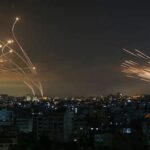
Iranian missiles were intercepted over Jerusalem early Monday, triggering air raid sirens and explosions, following reported U.S. strikes against Iran-backed militia groups in Iraq and Syria. The incident marks a significant escalation of tensions in the region already inflamed by the ongoing conflict in Gaza and heightened concerns about a wider regional war.
Jerusalem residents were jolted awake around 1:45 a.m. local time by the sound of sirens, followed by the unmistakable booms of interceptions carried out by Israel’s air defense systems. While initial reports were unclear regarding the origin of the missiles, U.S. officials later confirmed they were launched from Iran. The Israel Defense Forces (IDF) stated that they were investigating the details of the attack and assessing the potential damage.
“We are aware of the reports and are currently gathering information,” an IDF spokesperson said shortly after the incident. “Our air defense systems were activated in response to a potential threat, and we are evaluating the situation.”
The missile attack occurred shortly after reports emerged of U.S. military strikes targeting facilities used by Iranian-backed militia groups in Iraq and Syria. These strikes were reportedly in retaliation for recent attacks against U.S. forces in the region, further escalating the already precarious security situation.
According to U.S. officials, the strikes were “defensive” and aimed at degrading the capabilities of groups responsible for endangering American personnel. The specific targets included weapons storage facilities and command-and-control centers.
The timing of the missile attack and the U.S. strikes has raised concerns about a coordinated escalation between Iran and its proxies and the U.S. and its allies. The potential for a wider regional conflict is now a significant concern for international observers.
Escalating Tensions
The incident in Jerusalem is the latest in a series of escalating events that have raised fears of a broader regional conflict. The ongoing war in Gaza, which began after Hamas’s October 7th attack on Israel, has already ignited tensions across the Middle East. Iran, a long-time supporter of Hamas, has been accused of providing the group with weapons, training, and financial support.
The U.S. has maintained a strong military presence in the region, aimed at deterring further escalation and protecting its interests and allies. However, the recent attacks against U.S. forces in Iraq and Syria have prompted a more forceful response from Washington.
The U.S. strikes against Iranian-backed militia groups are intended to send a clear message to Tehran that attacks against American personnel will not be tolerated. However, they also carry the risk of provoking further retaliation and escalating the conflict.
International Response
The international community has expressed deep concern over the escalating tensions in the Middle East and called for restraint from all parties. The United Nations has urged all sides to de-escalate the situation and avoid any actions that could further destabilize the region.
“We are deeply concerned by the escalating tensions in the Middle East and call on all parties to exercise maximum restraint,” said a spokesperson for the UN Secretary-General. “It is essential to avoid any actions that could lead to a wider conflict.”
European leaders have also voiced their concerns and called for a diplomatic solution to the crisis. The European Union has offered to mediate between the parties and help find a way to de-escalate the situation.
The Threat to Jerusalem
The missile attack on Jerusalem underscores the vulnerability of the city to attacks from Iran and its proxies. Jerusalem is a holy city for Jews, Christians, and Muslims, and any attack on the city has the potential to ignite religious tensions and further escalate the conflict.
Israel has invested heavily in its air defense systems, including the Iron Dome, to protect the country from missile attacks. However, the Iron Dome is not foolproof, and some missiles may still be able to penetrate the defenses.
The attack on Jerusalem is a reminder of the ongoing threat posed by Iran and its proxies and the need for a comprehensive strategy to address the security challenges in the region.
Potential Consequences
The escalation of tensions between Iran and the U.S. has the potential to have far-reaching consequences for the Middle East and the world. A wider regional conflict could disrupt global energy supplies, trigger a humanitarian crisis, and further destabilize the region.
The potential for a nuclear confrontation is also a serious concern. Iran has been developing its nuclear program for years, and some fear that it could eventually develop a nuclear weapon. If Iran were to acquire a nuclear weapon, it could embolden it to take more aggressive actions in the region, further escalating the conflict.
Paths Forward
Finding a way to de-escalate the tensions between Iran and the U.S. is essential to preventing a wider regional conflict. A diplomatic solution is needed to address the underlying issues that are driving the conflict. This will require a willingness from all parties to engage in dialogue and compromise.
The international community must also play a role in de-escalating the situation. The UN, the EU, and other international actors can help to mediate between the parties and find a way to resolve the conflict peacefully.
Expanded Context and Analysis
The recent interception of Iranian missiles over Jerusalem, coupled with U.S. retaliatory strikes against Iran-backed militias, throws into sharp relief the highly volatile and intricate geopolitical dynamics of the Middle East. To fully comprehend the implications, a more granular examination of the involved parties, their motivations, and the historical context is paramount.
-
The Role of Iran: Iran’s foreign policy is deeply intertwined with its ambition to project itself as the preeminent power in the region. This ambition is pursued through a combination of direct military involvement, strategic alliances, and support for non-state actors. Iran’s backing of groups like Hezbollah in Lebanon, Hamas in Gaza, and various militias in Iraq and Syria serves as a cornerstone of its regional strategy, often referred to as the “Axis of Resistance.” Iran’s rationale includes countering the influence of Saudi Arabia, its main regional rival, and challenging the U.S. presence in the Middle East. Iranian leaders perceive the U.S. as an obstacle to their regional aspirations and view the presence of U.S. military forces as a direct threat to their national security. The Islamic Revolutionary Guard Corps (IRGC) plays a pivotal role in executing Iran’s foreign policy objectives, often operating outside the conventional diplomatic channels.
-
The U.S. Perspective: The U.S. has strategic interests in the Middle East, including maintaining regional stability, safeguarding the flow of oil, and protecting its allies, particularly Israel. The U.S. views Iran’s actions as destabilizing and perceives its support for militant groups as a direct threat to U.S. interests and the security of its regional partners. The U.S. strategy has involved a combination of military deterrence, diplomatic pressure, and economic sanctions to contain Iran’s influence. The recent U.S. strikes against Iran-backed militia groups in Iraq and Syria were framed as a defensive measure designed to protect U.S. personnel and deter future attacks. However, these actions also send a strong signal to Iran that the U.S. is prepared to use military force to protect its interests and allies.
-
The Israeli Angle: Israel views Iran as an existential threat, citing its nuclear program, its support for anti-Israeli militant groups, and its repeated calls for Israel’s destruction. Israel has consistently advocated for a more assertive approach to counter Iran’s regional activities and has conducted numerous covert operations to disrupt Iran’s nuclear program and undermine its support for militant groups. The interception of Iranian missiles over Jerusalem underscores the vulnerability of Israel to Iranian attacks and reinforces its determination to take whatever measures are necessary to protect its security. Israel’s close alliance with the U.S. provides it with significant military and diplomatic support, which serves as a deterrent against potential Iranian aggression. However, Israel’s willingness to act unilaterally, if necessary, remains a critical factor in its strategic calculus.
-
The Broader Regional Context: The Israeli-Palestinian conflict, the Syrian civil war, and the ongoing tensions between Saudi Arabia and Iran contribute to the overall instability of the Middle East. These conflicts create opportunities for external actors, such as Iran and the U.S., to exert their influence and further complicate the regional dynamics. The rise of ISIS and other extremist groups has also added to the complexity of the region, creating new challenges for regional and international actors. The proliferation of weapons, the flow of foreign fighters, and the spread of extremist ideologies have all contributed to the overall instability of the Middle East.
-
The Geopolitical Ramifications: The escalating tensions between Iran and the U.S. have significant geopolitical implications. A wider regional conflict could disrupt global energy supplies, trigger a humanitarian crisis, and further destabilize the Middle East. The potential for a nuclear confrontation is also a serious concern, as it could have catastrophic consequences for the region and the world. The involvement of other major powers, such as Russia and China, could further complicate the situation and lead to a more protracted and destabilizing conflict. The international community must work together to de-escalate the tensions between Iran and the U.S. and find a way to resolve the underlying issues that are driving the conflict.
Historical Parallels and Future Scenarios
Understanding the current crisis necessitates an appreciation of historical parallels. The “Tanker War” during the Iran-Iraq War in the 1980s serves as a stark reminder of how easily localized conflicts can escalate into broader regional confrontations. Similarly, the U.S. invasion of Iraq in 2003 unleashed sectarian violence and created a power vacuum that Iran skillfully exploited to expand its influence. These historical events underscore the potential for miscalculation and unintended consequences in the Middle East.
Looking ahead, several potential scenarios could unfold:
-
De-escalation and Diplomacy: A negotiated settlement between Iran and the U.S., possibly mediated by a third party, could lead to a de-escalation of tensions. This scenario would require both sides to make concessions and address the underlying issues that are driving the conflict. However, given the deep distrust and animosity between the two countries, this scenario is considered unlikely in the short term.
-
Containment and Deterrence: The U.S. could continue its policy of containment and deterrence, using a combination of military force, economic sanctions, and diplomatic pressure to constrain Iran’s behavior. This scenario would require a sustained commitment from the U.S. and its allies, as well as a willingness to tolerate a certain level of risk.
-
Limited Military Conflict: A limited military conflict between Iran and the U.S., possibly involving attacks on military assets or proxy forces, could escalate the situation further. This scenario could lead to a wider regional conflict, with potentially catastrophic consequences.
-
Full-Scale War: A full-scale war between Iran and the U.S. would be the most catastrophic scenario, with the potential to destabilize the entire Middle East and trigger a global crisis. This scenario is considered unlikely, but it cannot be ruled out entirely.
The Importance of Strategic Communication
In the midst of this crisis, strategic communication plays a crucial role. Misinformation, disinformation, and propaganda can all exacerbate tensions and make it more difficult to find a peaceful resolution. It is essential for governments, media organizations, and individuals to exercise caution and verify information before disseminating it. Clear and accurate communication can help to de-escalate tensions and promote understanding.
The Human Cost
Ultimately, the escalating tensions between Iran and the U.S. have a profound human cost. The people of the Middle East have already suffered through decades of conflict and instability. A wider regional war would only exacerbate their suffering and create new humanitarian crises. It is essential for all parties to prioritize the well-being of civilians and to work towards a peaceful resolution of the conflict.
The need for a nuanced approach:
The situation necessitates a move beyond simplistic narratives and a recognition of the multifaceted nature of the conflict. The roles of other regional actors, such as Saudi Arabia, Turkey, and Russia, must also be considered. A comprehensive understanding of the historical, political, economic, and social factors that are driving the conflict is essential for developing effective strategies to de-escalate tensions and promote stability. The international community must work together to address the underlying issues that are fueling the conflict and to create a more peaceful and prosperous future for the Middle East.
The incident underscores the fragility of the region and the ever-present danger of miscalculation. All parties involved must exercise utmost restraint and prioritize diplomatic solutions to avert a wider catastrophe. The coming days and weeks will be critical in determining whether the region can step back from the brink of a devastating conflict.
FAQ Section:
1. What triggered the Iranian missile attack on Jerusalem?
The Iranian missile attack on Jerusalem was reportedly triggered by recent U.S. strikes against Iran-backed militia groups in Iraq and Syria. According to U.S. officials, these strikes were in retaliation for attacks against U.S. forces in the region. The missile attack is viewed as a response to these U.S. actions, reflecting escalating tensions between Iran and the U.S. and their respective allies.
2. What kind of damage or casualties resulted from the missile attack?
While initial reports confirmed the interception of the missiles by Israel’s air defense systems, details regarding specific damage or casualties were not immediately available. The Israel Defense Forces (IDF) stated they were investigating the incident and assessing the potential damage. Further updates are expected as the situation is more thoroughly evaluated.
3. How has the international community reacted to the escalating tensions?
The international community has expressed deep concern over the escalating tensions in the Middle East. The United Nations has urged all parties to exercise maximum restraint and avoid any actions that could further destabilize the region. European leaders have also voiced their concerns and called for a diplomatic solution to the crisis, with the European Union offering to mediate between the parties.
4. What is the potential impact of these events on the broader Middle East region?
The escalating tensions between Iran and the U.S. have the potential to have far-reaching consequences for the Middle East. A wider regional conflict could disrupt global energy supplies, trigger a humanitarian crisis, and further destabilize the region. The potential for a nuclear confrontation is also a serious concern, given Iran’s ongoing nuclear program and the possibility of it developing nuclear weapons.
5. What are the possible solutions to de-escalate the current situation?
De-escalating the tensions requires a multi-faceted approach. This includes diplomatic dialogue between Iran and the U.S., potentially mediated by international actors, to address the underlying issues driving the conflict. It also involves restraint from all parties to avoid further military actions that could escalate the situation. Additionally, addressing the broader regional conflicts, such as the war in Gaza and the Syrian civil war, is crucial to fostering a more stable environment. A comprehensive strategy involving political, economic, and security measures is needed to achieve lasting peace and stability.









